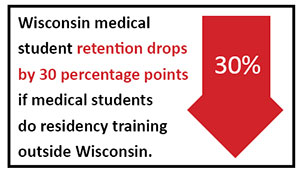Graduate Medical Education
Graduate Medical Education (GME) refers to any type of formal medical education, usually hospital-sponsored or hospital-based training, pursued after receipt of the M.D. or D.O. degree in the United States. This education includes internship, residency, subspecialty and fellowship programs, and leads to state licensure and board certification.
Addressing Wisconsin’s Primary Care Physician Shortage
Investing in Graduate Medical Education Means Physicians Stay in Wisconsin
The Problem
 Wisconsin’s aging health care workforce and aging patient population is creating challenges for the state’s health care delivery system and is cause for concern for access to care, especially in rural Wisconsin. Statewide data shows Wisconsin needs between 2,000 and 4,000 additional physicians by 2035.
Wisconsin’s aging health care workforce and aging patient population is creating challenges for the state’s health care delivery system and is cause for concern for access to care, especially in rural Wisconsin. Statewide data shows Wisconsin needs between 2,000 and 4,000 additional physicians by 2035.
In 2003, Governor Doyle proposed and signed into law a state budget that cut $45.1 million from residency training in Wisconsin. Residency training is done once a medical student completes medical school and their training location is oftentimes where they end up practicing.
Since then, Governor Walker and the state legislature have taken steps to backfill these cuts by investing $5 million into creating new residency positions to expand our physician workforce. While we have a long way to go to backfill previous cuts, this GME matching grant program is a good first step that needs to be strengthened.
The Solution – “Grow Our Own”
We know that Graduate Medical Education (often called “residency training” that medical students receive following medical school) is a key factor in where physicians end up practicing. In fact, 86% of students from Wisconsin, who attend a medical school in Wisconsin and do their residency training in Wisconsin, will ultimately stay here to practice. That number drops by 30% if these students do residency training somewhere else.

Governor Walker and the state legislature have found a successful model to recruit and retain additional physicians to practice in Wisconsin. This new grant program, started in 2013, has helped by creating 23 new Wisconsin residency programs and expanding 17 existing Wisconsin programs. The GME "Grow Our Own" grant program has created 193 new residency slots; that pipeline will prepare 86 physicians each and every year once full. "Grow Our Own' grants are matched dollar-for-dollar by hospitals, health systems and medical schools and have resulted in $65 million in public and private investment for GME in Wisconsin.
Watch the video:

